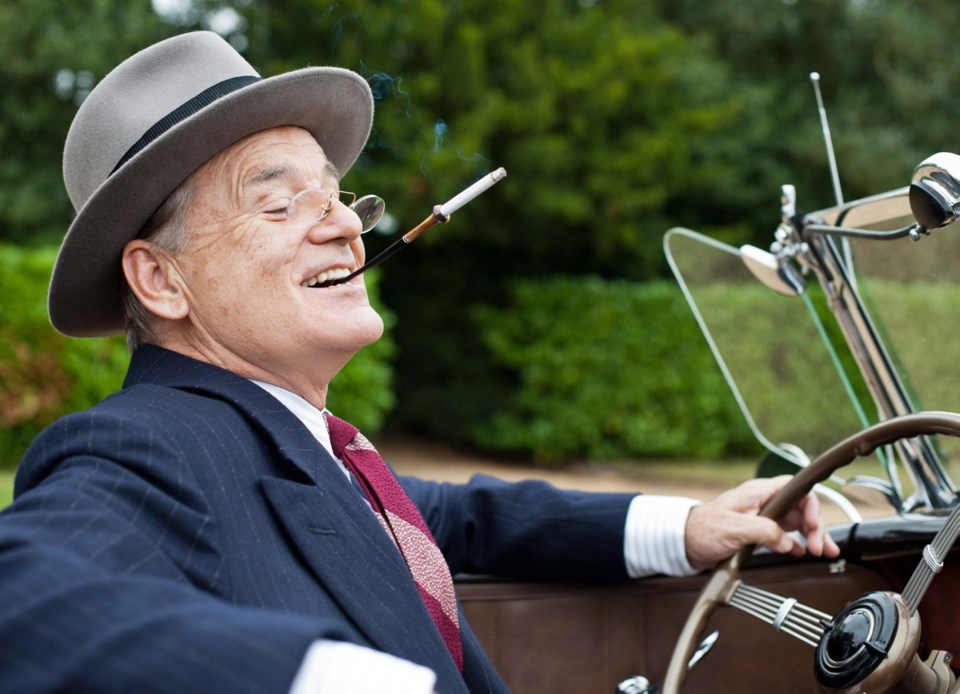TELLURIDE, Colorado ‚ÄĒ Actors are used to pressure, but the task before Bill Murray in Hyde Park on Hudson was more than a little stressful.
Director Roger Michell said that if the Ghostbusters and Groundhog Day veteran didn‚Äôt want to star as Franklin Delano Roosevelt, he wouldn‚Äôt make the movie at all, and Murray knew he would be playing someone so famous, as the actor put it, that ‚Äúhe‚Äôs on the dime!‚ÄĚ
Although the film has received mixed reviews, the 62-year-old Murray has attracted some critical attention for his performance as FDR, including a Golden Globe nomination for lead actor in a comedy or musical, a category that includes Hugh Jackman from Les Miserables and Bradley Cooper for Silver Linings Playbook.
Hyde Park isn’t the only Murray movie receiving award consideration. Wes Anderson’s comedy Moonrise Kingdom, in which Murray plays the father of a runaway girl, is a contender for the original screenplay Academy Award and a dark horse for the best picture Oscar shortlist.
Set on the eve of the Second World War, Hyde Park on Hudson focuses on the 32nd president‚Äôs many romantic entanglements, most prominently his love affair with distant cousin Margaret ‚ÄúDaisy‚ÄĚ Suckley (Laura Linney), just as King George VI (Samuel West) and Queen Elizabeth (Olivia Colman) are coming to visit the president at his New York vacation compound.
As written by playwright Richard Nelson, the movie largely steers clear of global or even national politics. Instead, Hyde Park is chiefly concerned with FDR’s juggling of so many women, including his wife, Eleanor (Olivia Williams). In one of the film’s most striking scenes, the president’s sexual relationship with Daisy commences with some unusual philandering in the front of the president’s convertible.
In a late summer conversation at the Telluride Film Festival, Murray said he was attracted to the movie because it offered an unsentimental look at an unusual couple who, though not lonely, were clearly needy.
‚ÄúIt‚Äôs not necessarily romantic,‚ÄĚ the actor said. ‚ÄúBut it is intimate. These are two people who need each other.‚ÄĚ
The movie is informed in large part by Suckley‚Äôs diaries and correspondence with FDR, which Murray read along with a number of biographies. ‚ÄúHer stuff is on a completely different level,‚ÄĚ Murray said. ‚ÄúHe is saying stuff to her that he doesn‚Äôt share with anyone else. This is someone he trusted. She was intelligent. She was not a dowdy, hopeless woman.‚ÄĚ
Murray called FDR ‚Äúthe most formidable character‚ÄĚ he‚Äôd ever played. He spent months researching the president‚Äôs life and listened to recordings of Roosevelt to approximate FDR‚Äôs voice.
Michell said he wanted only Murray because audiences grant him the slack that the role necessitates. ‚ÄúHe has a charismatic charm as an actor that lets you forgive his character‚Äôs mischief,‚ÄĚ the filmmaker said.
His younger sister‚Äôs contracting polio as an infant helped guide the stoicism found in Murray‚Äôs performance. Her treatments in the 1950s included immersion in scalding water, and Murray recalled hearing her screams. ‚ÄúThat shaped the state I was in while I worked because I realized she didn‚Äôt complain about anything.‚ÄĚ
Although he’s not working as frequently as some of his peers, Murray could return next awards season with another two contenders under his belt: He has George Clooney’s The Monuments Men and Anderson’s next film, The Grand Budapest Hotel, both due out next year.



